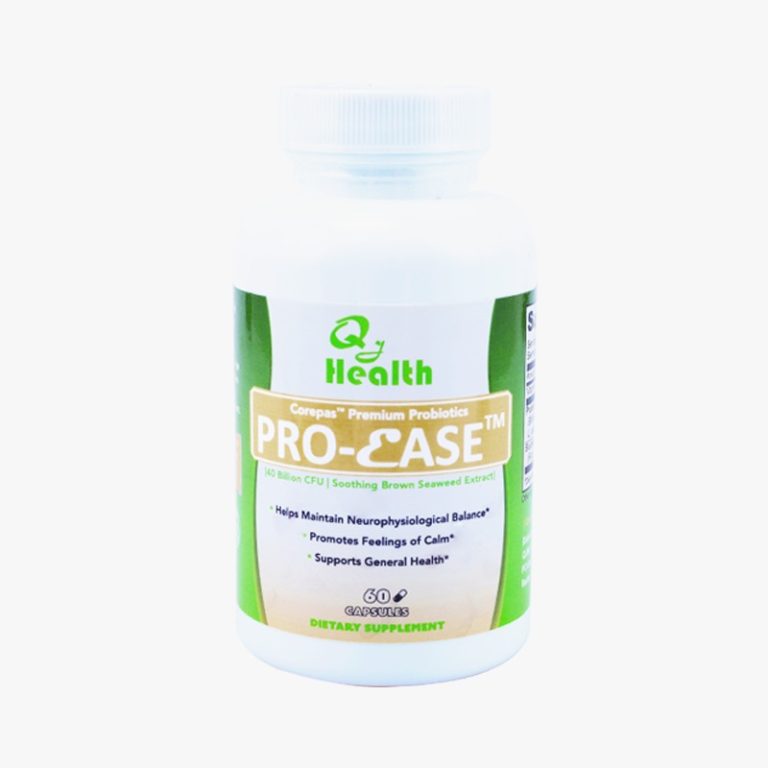Could The Gut Homeostasis Promotes
Self-Healing?


PRO-EASE
01 -
Gut-Brain Axis
Gut health plays a pivotal role in overall wellness, as it affects not only physical but also emotional well-being. The intricate connection between the gut and the brain, known as the gut-brain axis, underscores the importance of maintaining a balanced gut microbiome. The gut-brain axis represents a vital nexus linking gut health and mental, emotional, and physiological well-being, including stress regulation and sleep quality. The gut microbiota, the diverse community of microorganisms residing in intestines, plays a crucial role in this communication by producing various neurotransmitters, hormones, and metabolites that can profoundly influence neural function and behavior. Conversely, the brain can impact gut function through the autonomic nervous system and the release of stress hormones. This bidirectional relationship exerts a remarkable impact on mental and emotional states, stress modulation, and even sleep patterns. The dynamic interplay has significant effect on managing conditions such as mood disorders and sleep disturbances, underscoring the pivotal role of gut health in fostering holistic well-being.

02 -
stress
The lack of attention to stress is so concerning because stress is one of the top indicators of health and body homeostasis[1]. Current epidemiological studies have shown that about 12% of people are affected by an anxiety disorder in a given year and between 5-30% are affected at some point in their life. These disorders occur about twice as often in females as males, and generally begin before the age of 25 [2]. Anxiety can cause nausea, abdominal pain, weight gain, and even more serious gastrointestinal conditions. A large and growing number of medical evidence shows that gut microbiota influences the development of emotional behavior, stress- and pain-modulation systems. Both of microbes’ own structural components and metabolites produced by them can serve as the signal molecules. These signals can affect distal organs metabolism either directly or by signaling through nerves or hormones from the gut. Studies have shown that the gut microbiota influences the mood, and participates the stress response via the gut–brain axis [3,4]. PRO-EASE have a positive effect on both the body and the mood. In addition, the gut-brain relationship is bidirectional, meaning that changes in microbial flora can affect behavior, and behavioral changes can affect the gut flora too.

03 -
SLEEP
Precious, seemingly unattainable sleep is the most joyful thing in the world. There’s nothing more frustrating than having an exhausting day, only to find one cannot shutdown once it’s time for bed. Is it true that sleep deprivation can cause high blood pressure? Possibly. A recent study by the American Heart Association found that those who have healthy sleep habits experienced a 42 percent lower risk of heart failure compared with those with poor sleep patterns. Disrupted sleep is also negatively related to mood states. The characteristic of the gut microbiome are related to the host’s sleep and circadian rhythm. Moreover, emotion and physiological stress can affect the composition of the gut microorganisms. The gut microbiota plays a crucial role in this bidirectional communication, since it can influence mood by producing neurotransmitter precursors, which reach the brain where they regulate the level of specific neurotransmitters.

04 -
Stress and Aging
A recent study found that chronic stress may contribute to faster aging. This study was conducted with 444 individuals between the ages of 18 and 50 to assess the role of stress and self-control on aging. Based on blood samples and self-report of participants, researchers found that cumulative stress was linked with accelerated aging and insulin resistance, based on poor emotion regulation and such behavioral factors as smoking and Body Mass Index (BMI)[5].
People exposed to chronic stress age rapidly. Stress, particularly chronic stress, triggers a physiological response known as the “fight or flight” response. This response involves the release of stress hormones such as cortisol and adrenaline, which prepare the body to deal with potential threats. While this response is essential for short-term survival, prolonged or chronic activation of this stress response can have negative effects on various body systems over time. A study found out that on average, the highly stressed women had aged by an extra 10 years as indicated by shorter telomeres, which is the sign of cellular aging[6]. Individuals experiencing chronic stress may be more likely to engage in unhealthy habits such as poor diet, lack of exercise, and inadequate sleep. These can altogether contribute to the development of age-related health conditions, including cardiovascular diseases, diabetes, neurodegenerative disorders and certain cancers.
The imbalance in gut microbial composition and function can lead to a compromised gut barrier function, which has been associated with chronic stress. Therefore, by implementing stress-reduction techniques and adopting a healthy lifestyle, individuals can potentially promote a balanced life control and mitigate the negative effects of stress on aging.

REFERENCE:
[1] Eat right for your inflammation type: the three step program to strengthen immunity, heal chronic pain, and boost our energy. Maggie Berghoff. 2021, New York: Atria Books.
[2] Lifetime prevalence and age-of-onset distributions of mental disorders in the World Health Organization’s World Mental Health Survey Initiative. World
Psychiatry, 2007; 6(3): 168-76
[3] Signals from the gut microbiota to distant organs in physiology and disease. Schroeder BO, Bäckhed F. Nat Med, 2016; 22(10): 1079-1089
[4] Commensal microbiota affects ischemic stroke outcome by regulating intestinal γδ T cells. Benakis C, Brea D et al. Nat Med, 2016; 22(5): 516-523
[5] Psychological and biological resilience modulates the effects of stress on epigenetic aging. Transl Psychiatry. Harvanek Z, Fogelman N et al. 2021;11(1)
[6] Accelerated telomere shortening in response to life stress. Proceedings of the National Academy of Sciences. Epel, E.S. 101(49): 17312-1731
ALL INFORMATION PRESENTED IN THIS WEBSITE IS INTENDED FOR INFORMATIONAL PURPOSES ONLY AND NOT FOR THE PURPOSE OF RENDERING MEDICAL ADVICE. THE INFORMATION CONTAINED HEREIN IS NOT INTENDED TO DIAGNOSE, TREAT, CURE OR PREVENT ANY DISEASE.






